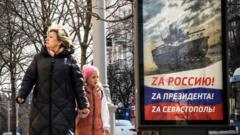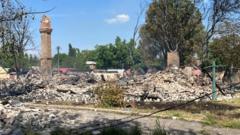As the harsh realities of life under Russian occupation unfold, Ukrainian women such as Maria and Sofia describe the struggle against repression and the erasure of their culture. With Ukrainian traditions and language being banned, these women continue to courageously resist, even as they live under constant surveillance and fear.
Voices of Resistance: Women Under Occupation in Ukraine Speak Out

Voices of Resistance: Women Under Occupation in Ukraine Speak Out
Amidst the oppressive conditions in Russian-occupied Ukraine, women like Maria and Sofia stand resilient, sharing tales of fear, resistance, and the fight to preserve their culture and identity.
In an era marked by conflict and hardship, the voices of women in Russian-occupied Ukraine provide a glimpse into the dire circumstances they face. One woman, who goes by Maria, illustrates the extent of repression, stating, "Russians are trying to ban everything Ukrainian here: language, and also traditions. Even Ukrainian holidays are forbidden." The plight of those under occupation remains severe, as they confront a landscape where their identity is systematically dismantled.
As negotiations for peace led by the U.S. unfold, the shadow of oppression looms large over these communities. The Kremlin's crackdown on dissent includes harsh penalties for those who resist or speak out against the regime. Amid fears that Ukrainian territories might be ceded in potential peace settlements, the resilience of inhabitants like Maria becomes increasingly important.
Maria is part of an underground resistance, focusing on non-violent protests through means like distributing leaflets. "You have fear in your eyes, but your hands are still doing it," she shares, emphasizing the bravery it takes just to hold onto Ukrainian identity in such a trying environment. Nonetheless, communication with her family and others in occupied areas is fraught with danger and distrust, particularly given the heavy surveillance imposed by Russian authorities.
Combatting the flow of disinformation, continuing to express their heritage carries risks. Sofia recounts her fears for her family, detailing how they were interrogated by Russian forces, accused of aiding the Ukrainian army. This escalating atmosphere of fear is compounded by the requirement for residents to adopt Russian citizenship to gain access to essential services, effectively erasing their Ukrainian identity.
While Maria and her compatriots in the underground resistance bravely fight back against the oppressive regime, they recognize the grave risks involved. The surveillance systems set up by the Russian occupiers serve as reminders of the stakes involved in their struggle for self-determination. The use of propaganda, threats, and arrests reflects a calculated strategy aimed at suppressing any form of dissent.
In occupied regions, propaganda is pervasive, with billboards plastered with images of Vladimir Putin and messages glorifying the occupation. Educational systems have also been co-opted to instill loyalty to Russia from a young age. The reality is grim, compounding the urgency of maintaining a spirit of resistance among the Ukrainian people.
Despite the sincere threats to their safety, various grassroots movements continue to operate, fostering a sense of unity and hope among the population. Groups focused on non-violent resistance are tirelessly working to oppose repression while striving to keep the essence of their culture alive amid relentless attempts at erasure.
The personal accounts of women like Maria and Sofia highlight not just the gravity of their situation under occupation, but also the undying spirit that prevails in the face of adversity. Their stories remind the world of the importance of standing against oppression and the value of cultural identity amidst conflict.




















